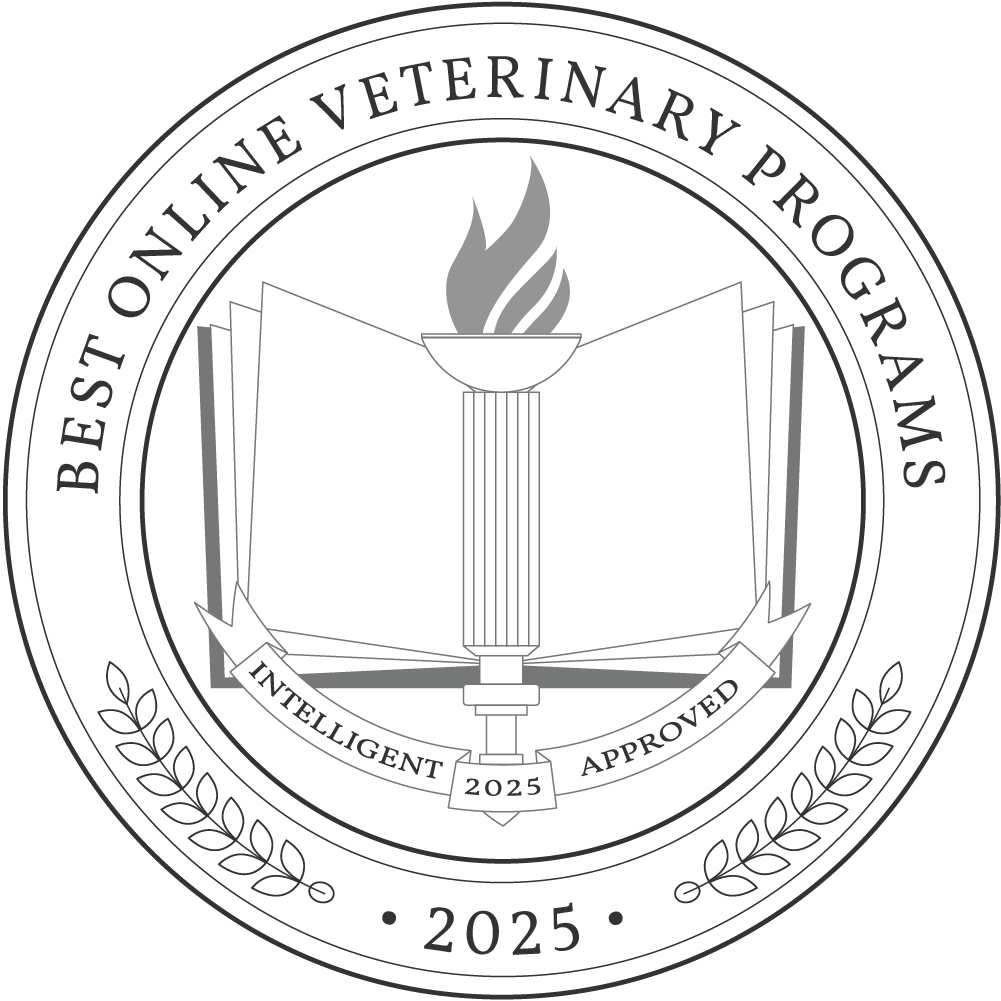For aspiring veterinarians needing a flexible way to achieve their goals, these online veterinary degree programs are an excellent place to kickstart your research. These programs offer a blend of online coursework and essential in-person requirements, ensuring that graduates gain practical, hands-on experience. Upon graduation, you’ll be prepared for a career as a practicing veterinarian, with a median salary of $119,100 in 2023.
Typically, these degree programs take three to four years to complete, though timelines vary, especially for part-time or dual-degree students. The average annual tuition for a graduate degree program is $20,513.
Why Trust Us
The Intelligent.com Higher Education Team is dedicated to providing students with independent, equitable school and program rankings and well-researched resources. Our expert-driven articles cover topics related to online colleges and programs, paying for school, and career outlooks. We use data from the U.S. Department of Education’s College Scorecard, the National Center for Education Statistics, and other reputable educational and professional organizations. Our academic advisory team reviews content and verifies accuracy throughout the year for the most current information. Partnerships do not influence rankings or editorial decisions.
- Analyzed over 2,000 national, accredited, and nonprofit colleges and universities
- 800+ rankings pages are reviewed and updated yearly
- Content is informed by reputable sources, surveys, and interviews with academic advisors and other experts
- Over 100 data points are reviewed for accuracy and quality throughout the year, including sources
How we rank schools
Our list features the best online Veterinary degree programs at top colleges nationwide. Each school featured is a nonprofit, accredited institution — either public or private — with a high standard of academic quality for post-secondary institutions.
We evaluated each school’s program on tuition costs, admission, retention and graduation rates, faculty, reputation, and the student resources provided for online students. We collected data from trusted sources like the National Center for Education Statistics, individual school and program websites, school admissions counselors, and other data sources. Then, we calculated the Intelligent Score on a scale of 0 to 100 based on the following criterion:
Academic Quality:
- Admission rate versus enrollment rate
- Retention rate of students who return after year one
- Accreditation status (regional and programmatic)
- Nonprofit status, both private and public institutions
Graduation Rate
- Overall graduation rate
- Total number of currently enrolled students, including diversity metrics
- Student-to-faculty ratio
Cost and ROI
- In-state and out-of-state per-credit tuition rates and fees
- Required credits to graduate
- Earning potential after graduation
- Availability of federal student loans, scholarships, and other financial aid options
Student Resources
- Available student services for online-only and hybrid programs
- On-campus amenities like tutoring centers and the number of libraries
Read more about our ranking methodology.
Best 3 Accredited Online Veterinary Degree Programs
FiltersInstitution Type
Status
- Intelligent Score
- Alphabetically By University Name
- Acceptance Rate
- Enrollment
- In-state Graduate Tuition
- Out-of-state Graduate Tuition
- In-state Undergraduate Tuition
- Out-of-state Undergraduate Tuition

Tuskegee University
Intelligent Score: 98.61In-state: $19,594
Out-of-state: $19,594
In-state: $20,378
Out-of-state: $20,378
SAT: 860-1045
ACT: 18-24
$446
Online
Southern Association of Colleges and Schools Commission on Colleges
142

University of Missouri
Intelligent Score: 95.21In-state: $9,330
Out-of-state: $27,612
In-state: $9,478
Out-of-state: $9,478
SAT: 1110-1320
ACT: 23-29
$569
Online
Higher Learning Commission
120

St. Petersburg College
Intelligent Score: 93.46In-state: $19,485
Out-of-state: $26,089
In-state: NA
Out-of-state: NA
SAT: Not Required
ACT: Not Required
Resident: $122
Non-Resident: $425
Online
American Veterinary Medical Association
120.0
How to Choose an Online Veterinary Program
Choose your area of study
There are many areas of study, or specializations, available to veterinary students that can help focus your studies on a particular area of the field. These options may include small animal practice, equine medicine, exotic animal care, and veterinary surgery. To start, consider asking yourself the following questions:
- What specific animal species am I most passionate about working with?
- What are the potential earning prospects and work environments for this specialization?
- How does this specialization align with my long-term career goals and interests?
For example, small animal practice is ideal for those interested in working with pets, while equine medicine suits those passionate about bourses. Exotic animal care prepares students for roles in zoos or wildlife conservation, and veterinary surgery is best for those aiming to perform advanced surgical procedures.
Research schools and programs
Leveraging your intended specialization can help strengthen your research efforts, providing you with a narrower scope. You may come into this process with some questions of your own, but here are a few other things to consider:
- What are the core courses and electives offered in my specialization?
- Are there faculty members who specialize in this area?
- What kind of practical experiences — like labs and residencies — are required?
- What are the career outcomes and job placement rates for graduates in this field?
Most of this information will be readily available on program websites, through academic advisors, and by attending information sessions.
Prepare for tests and applications
With your shortlist of programs in hand, you can focus on test and application prep. Start by gathering standard materials — like transcripts and letters of recommendation — early, as these can take time to collect. Begin writing your personal statement well in advance to allow enough time for revisions. Additionally, you might consider enrolling in a GRE test prep program to boost your scores.
Select your program
If you apply to multiple programs, it’s possible to receive more than one acceptance letter. To select the right program for your goals, revisit your initial research criteria and focus on what matters most to you — such as specialization availability, the faculty you’ll learn from, and practical experience opportunities. This is also the time to reassess the total cost of attendance, including tuition, fees, and course materials, and compare it alongside any financial aid offers.
Determine how you’ll pay for your degree
To finance your degree, you can start by filing for the FAFSA to access federal financial aid. Then, turn your attention to institutional scholarships, grants, and assistantships your school offers. You may also be eligible for employer tuition reimbursement if you’re employed in a veterinary practice or a related field.
In instances involving financial gaps, be sure to prioritize federal loans over private loans, as these typically have lower interest rates and better repayment options.
What Can You Expect From an Online Veterinary Program?
By enrolling in an online veterinary program, you can expect a combination of online coursework and in-person practical experience. These programs typically cover various topics essential for veterinary practice — including animal anatomy and physiology, pathology, pharmacology, and diagnostic techniques. The most innovative curriculums will also explore animal behavior, ethics, and veterinary business management.
While much theoretical learning is accessible online, most programs mandate in-person labs or residences to ensure hands-on experience. These practical components are crucial for developing clinical skills, including performing physical exams, surgical procedures, and administering treatments under the supervision of experienced veterinarians.
The estimated completion timeline for these programs varies but generally ranges from three to four years. Some programs may offer accelerated tracks or part-time options to accommodate different schedules.
Potential courses you’ll take in an online veterinary program
- Animal Anatomy and Physiology: A fundamental course in virtually all programs, this class covers the structure and function of different animal systems — including skeletal, muscular, cardiovascular, and respiratory systems. Students will learn to identify anatomical features and understand how these systems work together to maintain animal health.
- Veterinary Pathology: In this core course, students study diseases and the changes they cause in animal tissues and organs. They learn to diagnose diseases through lab work, including microscopic examination of tissues and interpreting diagnostic tests.
- Pharmacology and Toxicology: This course focuses on the principles of drug action, therapeutic uses, and potential toxic effects of animal medication. Participants will learn about different classes of drugs, their mechanisms, and safe administration practices.
- Animal Behavior and Welfare: Occasionally deemed an elective or upper-level course, this class explores the behavioral patterns of different animal species and the principles of animal welfare. Students learn to assess and address behavioral issues, ensuring the psychological well-being of animals in other settings.
- Veterinary Business Management: This upper-level course introduces students to the business aspects of running a veterinary practice. Topics may include financial management, client relations, and marketing strategies, providing future veterinarians with the skills to manage a successful practice.
Online Veterinary Degree Frequently Asked Questions
How do I apply to an online veterinary degree program?
While some admissions requirements vary by program, many share a similar set of criteria — including:
- Bachelor’s degree from an accredited institution
- Minimum GPA, usually 3.0 or higher
- Official transcripts
- GRE scores
- Letters of recommendation
- Personal statement
- A minimum of 200 hours of veterinary experience
It is highly recommended that you contact an admissions counselor to ensure you meet all the requirements and receive guidance on the application process. Reaching out early can help clarify questions and strengthen your application.
How much does an online veterinary degree cost?
The average cost of tuition for graduate degree programs is $20,513 per year. However, it’s crucial to evaluate the total cost of attendance to understand the full financial investment. This includes tuition and fees, course materials, textbooks, and any additional expenses related to in-person labs or residencies.
Carefully considering all these factors will provide a more accurate picture of the overall cost, helping you to plan and budget effectively for your education.
How long does it take to earn an online veterinary degree?
Obtaining this degree takes three to four years for full-time students. For part-time students, this timeline can extend to five to seven years. If you’re balancing your studies with work, family commitments, or other personal responsibilities, part-time enrollment may be the best fit. Conversely, full-time enrollment may work better for you if you can dedicate more time to your studies and wish to complete your degree faster, potentially entering the workforce sooner.
Evaluating the total credit requirements is important, as these can vary by institution and significantly impact completion timelines. Knowing these credit requirements can help you plan your course load and manage your time effectively, ensuring you stay on track to meet your goals.

